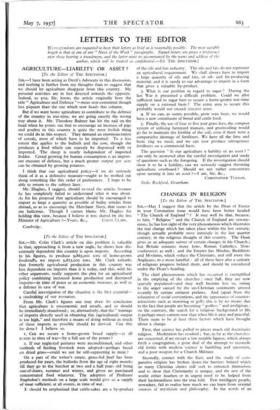[To the Editor of THE SPECTATOR.]
SIR,—Mr. Colin Clark's article on this problem is valuable in that, approaching it from a new angle, he shows how dis- astrously dependent this country is upon imports. According to his figures, to produce 9,863,000 tons of home-grown foodstuffs, we import 9,875,000 tons. Mr. Clark remarks that formerly agricultural production in this country was less dependent on imports than it is today, and this, with his other arguments, really supports the plea for an agricultural policy combining increased home production and decreased imports—in time of peace as an economic measure, as well as a defence in case of war.
Careful investigation of the situation is the first essential—. a stocktaking of our resources.
• From Mr. Clark's figures one may draw his conclusion that agriculture is uneconomic and unsafe, and so should be immediately abandoned ; or, alternatively, that the" tonnage of imports directly used in obtaining this (agricultural) output is too high," and therefore a means of doing without as much of these imports as possible should be devised. Can this be done ? I believe so.
r. Can we secure a home-grown bread supply—at all events in time of war—by a full use of the potato ?
2. If our neglected pastures were reconditioned, and other methods of feeding livestock were adopted—perhaps based on dried grass—could we not be self-supporting in meat ?
On a part of the writer's estate, grass-fed (beef has been
produced.for years, the bullocks from the age c eight months till they go to the butcher at two and a half years old being
-out-of-doors, summer and winter, and given no purchased concentrated food whatever. The adoption of Professor StaFdedon's methods on a large scale would give us a supply of meat sufficient, at all events, in time of war.
1: should be emphasised that cattle-cakes are a by-product of the oils and fats industry. The oils and fats do not represent an agricultural requirement. We shall always have to import a large quantity of oils and fats, or oil- and fat-producing material, and it is surely to our advantage to import in a form that gives a valuable by-product.
3. What is our position in regard to sugar ? During the last War it presented a difficult problem. Could we allot sufficient land to sugar beet to secure a home-grown war-time supply on a rationed basis ? The extra area to secure this probably would not exceed 200,000 acres.
4. If we can, as seems possible, grow soya bean, we would have a new constituent of bread and cattle food.
5. Finally, the use of four or five year grass leys, the compost system of utilising farmyard manure, and greensoiling would go far to maintain the fertility of the soil, even if there were a comparative shortage of fertilizers. We have all the lime and basic slag we need, and we can now produce nitrogenous fertilizers on a commercial basis.
The question "Is our agriculture a liability or an asset ? " can only be answered after the careful investigation and study of questions such as the foregoing. If the investigation should show it to be a liability, can we seriously suggest throwing agriculture overboard ? Should we not rather concentrate upon turning it into an asset ?—I am, Sir, &c., Stoke Rochford, Grantham.
CHRISTOPHER TURNOR.














































 Previous page
Previous page